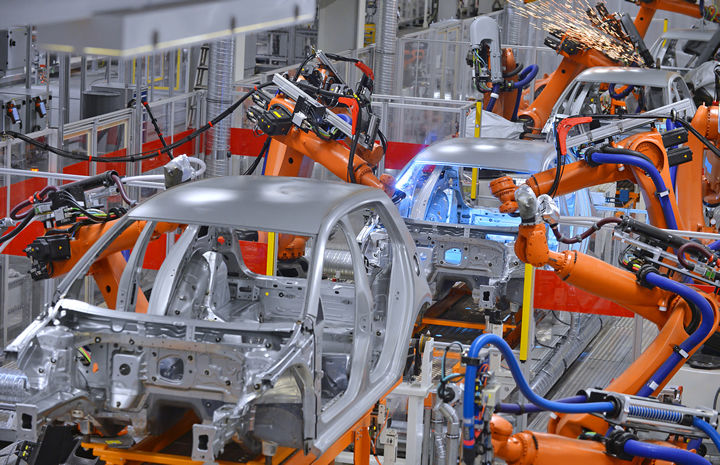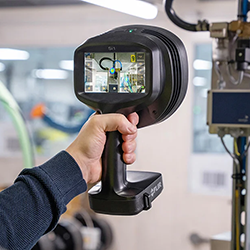7 Reasons Cloud Data is Driving the Future of Auto Manufacturing

The use of data analytics in manufacturing is growing. Automakers must keep up with this shift if they hope to remain competitive, but not all data initiatives are equal. As auto manufacturers become more data-centric, they should prioritize cloud adoption over conventional, on-premise alternatives.
Storing and analyzing auto manufacturing data in the cloud has several advantages automakers can’t afford to miss. Here’s a closer look at these benefits and why cloud data will drive the future of auto manufacturing.
1. Process Optimization
The potential for process optimization is one of the most common benefits of data analytics in manufacturing. Data from production workflows provides the information automakers need to remove bottlenecks and streamline manufacturing, and the cloud is the ideal vehicle for that data.
Artificial intelligence (AI) can identify defects and other shortcomings up to 90% more accurately than humans. This accuracy makes it an excellent tool for highlighting where and how workflows can improve. However, AI models require vast amounts of data, so automakers need scalable, cost-effective data solutions like the cloud.
Cloud computing is easier to expand or shift to meet changing needs than on-premise storage and analytics. Consequently, it’s a better option for hosting these AI models and their data.
2. Supply Chain Transparency
Automakers can also use cloud data to gain more insight into their supply chains. Real-time visibility is fundamental to mitigating supply chain disruptions, which are becoming increasingly common. Cloud data analytics enables this transparency.
Internet of Things (IoT) tracking solutions can provide real-time data on shipments and suppliers. Cloud platforms can then consolidate this information into an easily accessible, single pane of view, making it easier to interpret and respond to emerging trends. This visibility lets automakers adjust shipping methods, orders or production schedules to prevent costly ripple effects from a single disruption.
Storing this data in the cloud also enables smoother data sharing and communication. Collaborative efforts become easier as a result, leading to fewer disruptions and miscommunications.
3. Inventory Management
Data-driven inventory management is a similar application for data analytics in manufacturing. IoT tracking and cloud-based data management platforms enable real-time visibility across warehouses and other storage facilities to enable agile production and prevent common inventory issues.
Conventional inventory management practices rely on human input and records that quickly become outdated. Consequently, mistakes leading to part surpluses and shortages are likely. IoT and other tracking technologies provide more up-to-date records, but these are only useful if workers can see all this information in one place. The cloud offers that consolidation.
Cloud inventory platforms provide a single place to view all inventory level and location data. Automakers can then make more informed restocking and picking decisions to streamline production and prevent disruptions despite demand or supply chain shifts.
4. Data-Driven Vehicle Design
A less conventional but equally promising use case for auto manufacturing data analytics is optimized vehicle design. Some automakers use cloud platforms to consolidate and analyze data from existing vehicles. This insight provides a baseline to inspire better future products.
Data from on-the-road vehicles can reveal common issues for manufacturers to tackle in future vehicle designs. Alternatively, they can show which features work best or see the most use to indicate what consumers want most in a car.
Cloud data platforms also support digital twins in the design phase. These digital models use real-time data to enable reliable virtual testing and suggest possible changes. As a result, automakers can test new features with fewer resources and create more innovative products in less time.
5. Ongoing Maintenance
Similarly, cloud data analytics can offer crucial insight into ongoing maintenance concerns. IoT solutions in existing vehicles can send real-time performance data to the cloud, where technicians can analyze it to pinpoint developing issues. This insight, in turn, leads to faster, more effective responses.
Automakers faced more than 1,000 recalls in 2022 alone. The cloud provides the insight and agility necessary to recognize issues earlier, leading to a quicker recall. Auto manufacturers can minimize the damage and protect drivers’ lives as a result. In cases where an over-the-air software update fixes the issue, these fast responses are even more effective.
The same benefits apply to production floor machinery. Automakers can use cloud data platforms to predict maintenance issues in their equipment, letting them fix the machines before larger, costlier breakdowns occur.
6. Data Accessibility
Many of these benefits of data analytics in manufacturing are technically achievable without the cloud, but fully capitalizing on them without it is challenging. That’s partly because cloud platforms make data far more accessible.
The cloud is accessible from anywhere, not just in certain facilities or on specific devices. Consequently, automakers can pull up supply chain insights or maintenance data anywhere at any time. On top of enabling faster reactions to emerging issues, this accessibility allows for greater remote collaboration.
Making key insights accessible regardless of time or location lets automakers work more seamlessly with international teams. They can then benefit from the world’s top talent and remain productive despite regional labor shortages. Increased collaboration will also lead to more innovative vehicle or workflow designs.
7. Scalability
The cloud is also more scalable than other data technologies. Automotive companies are investing millions of dollars in AI and other Industry 4.0 technologies every year. However, these technologies either require or produce substantial amounts of data to deliver meaningful results. On-premise solutions can’t sustain that growth.
Expanding or upgrading on-premise data solutions requires expensive hardware purchases, installation times and disruption from momentarily taking things offline. By contrast, expanding or upgrading cloud infrastructure is often a matter of simply paying a slightly higher rate.
Scaling up in the cloud is far faster and more cost-effective than other data technologies. Consequently, automakers who embrace a cloud-first strategy can see returns from data analytics tools like AI or the IoT faster and with less disruption.
Auto Manufacturing Data Needs the Cloud
Auto manufacturing data is key to thriving in tomorrow’s industry. The cloud is the best vehicle for making the most of this invaluable resource.
As the automotive industry becomes increasingly digitized and data-centric, the need for cloud platforms will rise. Cloud computing offers the speed, flexibility and accessibility automakers need to turn their data into results.
Comments (0)
This post does not have any comments. Be the first to leave a comment below.
Featured Product

